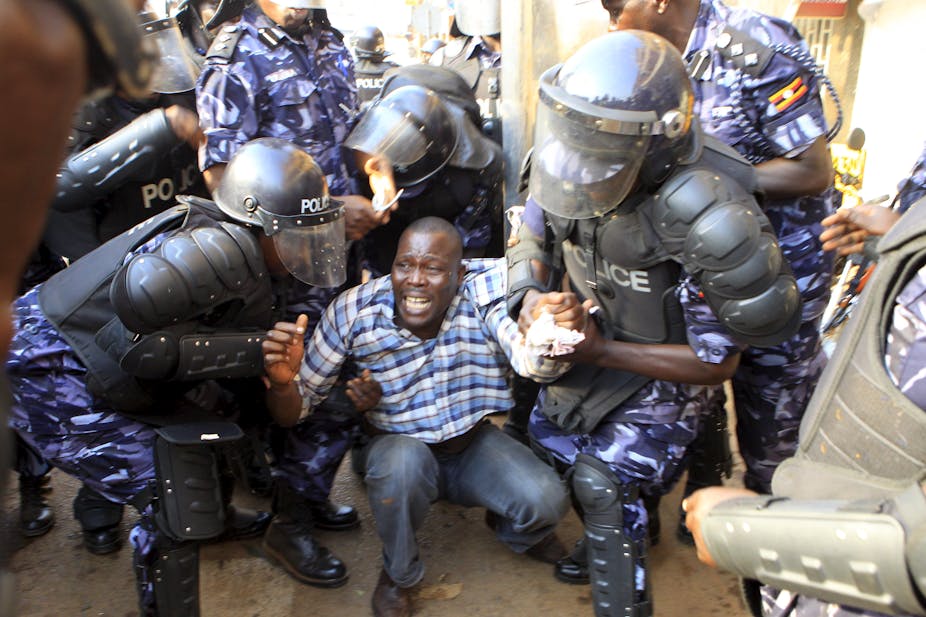The heavy-handed tactics used by Uganda’s police during the recent controversial election have raised concerns that the state is taking a turning towards authoritarianism.
The police used brutal force against supporters of the opposition Forum for Democratic Change and, after the election, made “preventative” arrests of high-profile members of the opposition. The state claimed the arrests were made to prevent the escalation of city-wide protests against the contested election results.
The Ugandan state machinery sank to a new low in electoral mismanagement and human rights violations during the poll, which saw Yoweri Museveni returned as president. He is now serving a fifth term and has been in power for 30 years.
The government shut down access to social media networks, ostensibly to prevent the spread of dangerous propaganda. Opposition leader Kizza Besigye was locked up after trying to expose alleged vote-rigging. And people who had waited patiently in sweltering heat at polling stations that remained closed were teargassed.
Police action against the opposition has led to fears that Uganda is slowly regressing to its dark past.
Long history of police repression
The use of the police as an instrument of state repression and a tool of the ruling party has a long history in Uganda.
Idi Amin’s oppressive regime, which lasted from 1971 to 1979, deployed the Public Safety Unit and the State Research Bureau to torture and murder people.
During his reign of terror, Amin passed a decree that allowed the police to get away with the abuse of power as long as it was:
… done for the purpose of maintaining public order or public security in any part of Uganda or for the defence of Uganda.
No such decree exists today. And Museveni’s regime is credited with speaking against acts of impunity by the military and the police.
But the enactment in 2013 of a new public order management law has been criticised by Amnesty International and other groups as repressive. The human rights body has decried the “pattern of repression” as an attempt by the government to restrict freedom of expression and peaceful protest.
Police militarisation and politicisation
On the face of it, the Public Order Management Act seems harmless. But the law gives the police broad powers of discretion to shut down political meetings or stop them from taking place for trivial reasons.
On top of this, the Ugandan police force – which received training from North Korea last year – is being militarised and politicised by its current head, Major-General Kale Kayihura. Like Museveni, he is a former member of the liberation group, the National Resistance Army.
The militarisation and politicisation of the police raise a crucial question about their handling of protests during the 2016 elections: to what extent were they maintaining law and order rather than quelling resistance to an authority protesters perceived to be illegitimate?
Keeping the peace?
In the lead-up to the presidential elections, state officials made a point of reminding Ugandans of the country’s troubled past and what could happen if they threatened to disrupt peace.
The secretary-general of the ruling party, Justine Lumumba, went so far as to threaten state violence, stating that protests against the election results would be tantamount to disrupting peace. Her message was chilling:
When President Museveni, the chief fighter, is still seated on the throne, whatever they are planning, tell them the government of NRM [the ruling National Resistance Movement] is not going anywhere! Don’t send your children to bring chaos in Kampala and cause confusion during elections, disrupt peace in the country; government will handle you … you will be shot.
Such rhetoric reinforced and justified the use of heavy-handed public-order policing methods. The use of violence was common at election protests and opposition rallies. It also legitimised the suppression of those characterised as threatening that peace.

The opposition and electoral observers have accused the state police of partisan policing. In the lead-up to the presidential elections, this was clear from the way in which the state police applied double standards in enforcing electoral campaign rules. For instance, while the ruling party’s campaigns were allowed to exceed the designated time limit, crowds were dispersed when opposition rallies ran over time.
The police’s actions have perpetuated fear that is normally associated with an autocracy instead of a democracy. This has served to delegitimise the authority of the police as peacekeeper and, by extension, that of the state as capable of protecting its citizens.
The necessity of the rule of law
The government has further been criticised for infringing on the right to freedom of speech after it shut down social media on the day of the election. The government said the clampdown was to avoid the spread of propaganda that could threaten peace during the polls.
Added to that, various electoral observer missions stated that the elections were held in an “intimidating” environment, and were described as a “set-back for democracy” and a “sham”.
If Uganda is to continue on its path of “steady progress” and peace under Museveni, the state will need the buy-in of its citizens. That can only occur when people believe that the state machinery is not a tool for oppression.

